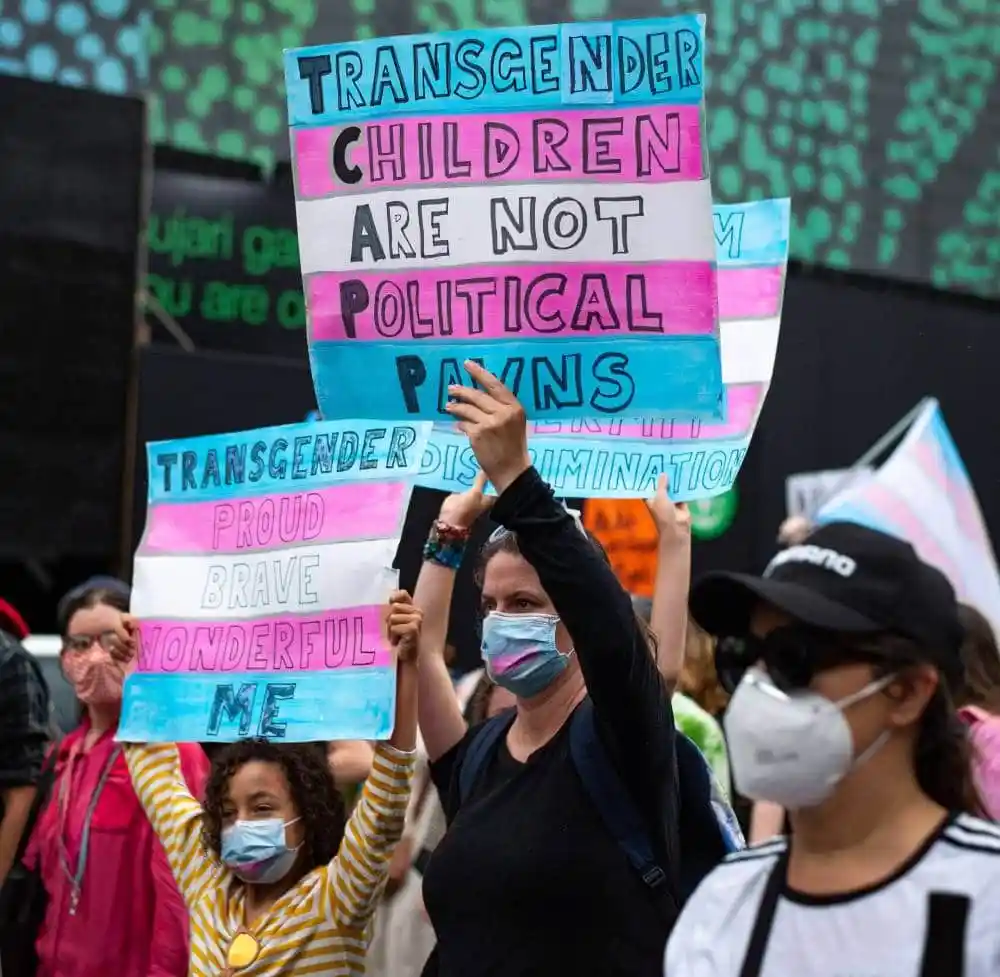Ohio is the latest state to pass bill blocking trans youth from gender-affirming care
Sign up for more LGBTQ+ news and updates at TrueQueer.
Ohio has become the latest state to pass a bill that restricts transgender and nonbinary youth from accessing gender-affirming care and participating in sports teams that align with their gender identity. The bill, known as House Bill 68, was passed by lawmakers on Wednesday and will now be sent to the Republican-led state House for amendments before it reaches Governor Mike DeWine’s desk for final approval.
House Bill 68 prohibits trans and nonbinary minors from receiving gender-affirming treatment, including hormone replacement therapy (HRT), puberty blockers, and medical or surgical procedures. Medical professionals providing such care to minors could face lawsuits and the loss of their licenses under this bill.
If House Bill 68 becomes law, Ohio will become the 23rd US state to restrict life-saving medical care for transgender and non-binary youth. This move has resulted in strong opposition from LGBTQ+ advocates, medical professionals, educators, and parents who believe that gender-affirming care is essential for the well-being of transgender and non-binary youth.
Gender-affirming care has been widely available in the US for over a decade and is endorsed by major medical associations, including the American Academy of Pediatrics, the American College of Physicians, the American Medical Association, the World Medical Association, and the World Health Organization. Numerous studies have shown that gender-affirming care is beneficial and significantly reduces rates of depression and suicide among transgender and non-binary individuals.
Despite the overwhelming evidence supporting gender-affirming care, Republican lawmakers in Ohio argue that teenagers are not capable of making informed decisions about their gender identity and that parents are being manipulated by physicians. Representative Gary Click, who introduced House Bill 68, claimed to have conducted extensive research on the topic but relied on outdated and debunked sources, as well as transphobic articles. Unfortunately, his arguments prevailed over the testimonies of LGBTQ+ advocates who spoke against the bill.
One of the advocates who testified against the bill was a teenager named Cassidy, who had detransitioned after transitioning to male at the age of 14. Cassidy emphasized that detransitioning did not ruin her life and that stories like hers should not be used as evidence to support bills that ban gender-affirming care. She warned lawmakers that banning transition-related care would have severe consequences for transgender and non-binary youth, potentially leading to increased rates of suicide.
Maria Bruno from Equality Ohio also spoke out against the bill, highlighting the detrimental impact it would have on children who are already receiving life-saving medications. She explained that many trans and non-binary children rely on these medications for their well-being and forcibly removing them from such treatment would have severe health implications.
In addition to restricting gender-affirming care, House Bill 68 also imposes limitations on trans athletes’ participation in sports. The bill requires schools, higher education institutions, and private colleges to designate separate single-sex teams based on students’ gender assigned at birth. It also allows individuals who believe they missed out on athletic opportunities or experienced harm due to the presence of a trans student on their team to sue their school and district.
While this bill may affect only a small number of student-athletes in Ohio, it adds to the growing list of states that have passed similar legislation. According to the Movement Advancement Project, 24 US states already have laws or regulations in place that ban trans student-athletes from participating in sports that align with their gender identity.
The passing of House Bill 68 in Ohio is a significant blow to the rights and well-being of transgender and non-binary youth. It disregards medical consensus and the lived experiences of trans individuals, putting their health and safety at risk. The fight for inclusivity and equal rights for transgender and non-binary individuals continues, as advocates work to challenge and overturn these discriminatory laws.
If you or someone you know is struggling with suicidal thoughts or mental health issues, please reach out to a helpline or mental health organization in your country for support.
Follow us on: Facebook for more LGBTQ+ news and updates at TrueQueer.
SEO Keyword: Ohio transgender youth bill, gender-affirming care, trans youth healthcare, Ohio trans healthcare legislation, Ohio trans youth rights
![]()

